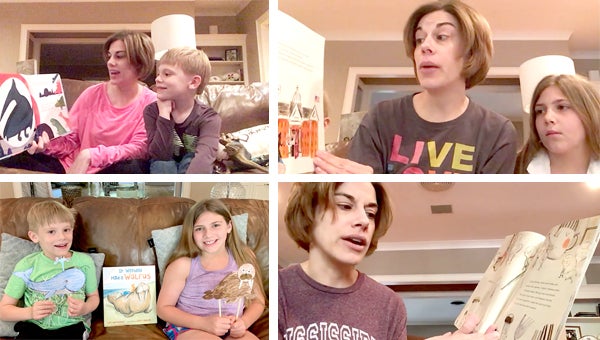During school closures, elementary school librarian takes to Facebook to share her passion for reading
Published 9:00 am Friday, March 27, 2020

- Bowmar Elementary School librarian Jennifer Nelson has taken to Facebook to continue reading to her students.
For the first time, school children from across the county are navigating their studies from home.
Because of the concerns about the spread of the COVID-19 virus, students are having classes via the internet while teachers, as well as parents, are helping to facilitate this new online component of learning.
Even though many of the younger generations are adept at using a computer, this sudden transition, especially for elementary students, has its challenges.
To help overcome that challenge, Jennifer Nelson, Bowmar Elementary School’s librarian, decided to take her love of reading and her passion for teaching to Facebook. With all of her students working from home, Nelson will often take to Facebook and share a story with her students through the school’s closed Facebook group.
“I thought this would be good for the kids to see a familiar face and encourage them to read while they are stuck at home, Nelson said.
As a librarian and the mother of two children — one in fourth grade and another in kindergarten — Nelson is very aware of how important it is for children to continue reading outside of the school environment.
“To keep up that skill, it is so important, schoolwise, to keep growing as readers,” she said, adding reading can also be therapeutic. “There is something called bibliotherapy, which is reading a book to help you work with whatever you are dealing with or whatever you are feeling.”
Though it may not be evident, children, like adults, could also be struggling with this new normal due to the coronavirus pandemic, but unlike adults, they may not know how to process it.
According to goodtherapy.org, reading can have a positive effect on moderate symptoms of mood-related conditions.
“When bad stuff is going on you need the arts. You need music, you need painting,” Nelson said.
Reading can also be used as an outlet.
Dating back to ancient Greece, goodtherapy.org stated storytelling, creative writing and reading have long been recognized for their therapeutic potential.
“Grecian libraries were seen as sacred places with curative powers,” the website stated.
Also, Benjamin Rush and Minson Galt II, who were physicians in the early part of the 19th century, used bibliotherapy as an intervention technique in rehabilitation and the treatment of mental health issues.
The website continued to state, “During World Wars I and II, bibliotherapy was used to help returning soldiers deal with both physical and emotional concerns.”
Nelson said the books she has chosen to read are “silly stories to just get their (students) minds off of everything.”
Julia and Reid, Nelson’s children, have also gotten involved.
“Their craft for the day was to make puppets and then we used the puppets in the read aloud,” she said.
Nelson said the most recent book to read is entitled, “Spork,” which is a story that celebrates being different and unique.
“Dad is a fork and Mom a spoon, so Spork doesn’t feel like he fits in with any of the other silverware,” she said. “And because he doesn’t have a place in the drawer, they never pull him out to use him for dinner because he is different.”
That is until a special utensil, a spork, is needed to assist the toddler in the family in eating spaghetti.
Nelson said she has received a lot of positive feedback from parents and students.
“In fact, so many people liked it, I shared it on my personal Facebook page as well, so my nieces and nephews, who live in other towns could see it,” Nelson said.
After receiving more than 1,000 likes after the first book, Nelson said, the United Way also shared it on their Facebook page.
Nelson said her goal is to read one to two books a week and she is considering continuing through the summer.
“There are a lot of librarians who are doing this,” she said. “You can get on YouTube and see lots of read aloud, but I thought it would be comforting for the students here to see my face.”






